You have no items in your cart. Want to get some nice things?
Go shoppingWe set Thomas Stewart a challenge to watch 25 films off the 250 Best IMDB list – from Jaws to Casablanca, Interstellar to Monster’s Inc.
Alien (& the Beginning of the Challenge)
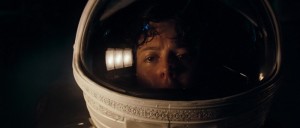
Ridley Scott, 1979, Number 53 on the list
The Nostromo. Captain Dallas, Officer Ripley, Lambert, Brett, Kane, Ash and Parker – this is the Nostromo’s crew, drifting in space, stopping on another planet and coming across something they wish they hadn’t. Everything about Alien is iconic. From Kane’s chest being torn open to the alien advancing toward Lambert, killing both her and Parker. The fact it is iconic does not just make it an original film, it was what made me appreciate what I was watching – a piece of history, a smart horror film, tapping into something that is as old as the day of time (our fear of the unknown, of the outsiders, of space itself) and transforming that through Ripley who is stuck, who is trapped with a dangerous, murderous, fully grown alien on the loose.
The film’s fourth act, in which Ripley is about to blow up the Nostomo and fly off in a small ship, is irritating. Why the hell didn’t she give herself more time? Why did she waste time trying to deactivate an alarm she knew she couldn’t deactivate? Why the fuck did she not look around that ship before she jetted off, blowing up her friend’s mangled corpses, her belongings, her work, and then realised the alien was aboard the current ship anyway? Then Ripley – rightly so – freaks out. The alien is there, resting, and she has no idea what the fuck to do now. So she climbs into a spacesuit and gasses the bastard until it lashes out. The gas, the suit, Ripley’s screaming and turning away from the alien, unable to look at it anymore, terrified, exhausted, wrecked, was beautiful cinema. The yellow and black, the close-up of Ripley’s face. I wanted it to end there. Somewhat of a cliff-hanger but a hammered home message of in space, no-one can hear you scream. No-one can hear Ripley scream but she will survive. I know that’s what the fourth act is – another shock, another way of showing Ripley’s survival and if the sequel had been better maybe my desired cliff-hanger ending would have worked.
Aliens (& Bad Sequels)
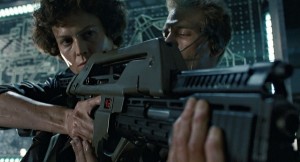
James Cameron, 1986, Number 64 on the list
Aliens is one of those sequels people talk about. They say it is just as good, if not better, than the original. It’s like The Godfather II, different and great. In the case of Aliens it’s the first of a series of bad attempts to be anywhere near as good as its original. Alien is art, Aliens is trash. It’s a different kind of film. It’s James Cameron pre-Avatar, on the side of the humans who blow up the aliens. What Aliens does, in flipping its genre, in making things bigger, grander, more explosive, is undo what Alien built itself on: this claustrophobic battle with something almost unbeatable. One of the scariest lines of the original is from Ash’s decapitated head when asked by Ripley how they kill it he replies, “you can’t.” No amount of bullets or knives will kill this alien. In Cameron’s more amped-up, man-will-always-win, guns-are-great world, you simply shoot the aliens. You blast them away with big ass guns and everyone is fine in the end. The only moment that showed me a glimmer of hope was when Ripley finds herself trapped in a room with Newt and two facehuggers. The ugliness of the Company’s force was always a lingering presence in the original film, its invisibility all the more scary, it was simply a robot – unemotional, unattached, surrendering the explorers to their fate. But we’re in James Cameron’s world now and any problem can be fixed by blowing it away.
The Wizard of Oz (& Identities)
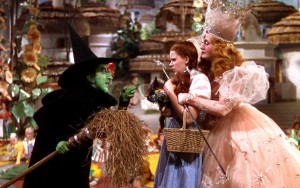
Victor Fleming, 1939, Number 212 on the list
Adaptation of Frank L Braum’s novel of the same name.
The Wizard of Oz is so high on my list of favourite films due to the fact of sentimentality – that my grandfather introduced me to the film and influenced my obsession with magic, witches and other worlds. But as I’ve grown, the story of Dorothy and her friends has become more than just a rich, beautifully shot film with a history of its own. It’s a story of dual identities. From Dr Marvel/The Wizard/The Fraud to Myra Gulch/The Wicked Witch of the East/West this is not just a switch-around of actors (or a way of saving the production’s cost) it’s another layer to the world within a world, a passage-way walked down to something far more magical than our world but just as corrupt. Dorothy is set a challenge – to kill the Wicked Witch of the West – and in setting upon her challenge, in taking back Oz for the Munchkins, in tracking down the Wizard to find answers and a way home, she is becoming someone else. Yet Dorothy doesn’t change. She remains the oblivious damsel. She gives her ‘where’s Toto?’ cries, she falls in the rophyphol-layered fields, she moans about wanting to go home, Dorothy is unchangeable. As a character, after going on this adventure and taking a witch’s life (yes, one day I will write a Dorothy the witch killer story), after meeting the Tin Man, The Lion, The Scarecrow, she is simply happy to be home. She is the same Dorothy as she always was. Yet the identities of all those around her change – the cowardly lion is given bravery, the scarecrow a brain, the tin man a heart. I, too, found my identity when watching this film, over and over again as a kid in my grandfather’s house. The Wizard of Oz became my film, Dorothy became my unavoidable, unchangeable heroine. The songs, from black and white to colour, the folk dancing down the Yellow Brick road were all mine.
The Shining (& Other Mania)
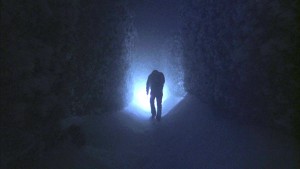
Stanley Kubrick, 1980, Number 58 on the list
The Shining as a film is a beautiful piece of cinema, a clever claustrophobic horror story that stuns with its set pieces, music and creepy twins. As a representation of Stephen King’s novel, however, it fails miserably. This is not an uncommon opinion, King himself had the same issues. When watching the film for this challenge – my fourth time – I saw the glaring problems. Jack Torrence (aka Jack Nicholson) is nuts from the minute he walks into Ullman’s office. The hotel and ghosts don’t drive him mad, his isolation and cabin fever lets him go completely mad and turn on his wife and son. There isn’t a lot of substance to the Torrence family of Kubrick’s creation – Jack is an angry, unlikeable guy who wants to murder his family, Wendy is a screaming, needy annoyance, the only absolution comes from Danny who is young, confused, intelligent, inquisitive, magical boy and, therefore, in more danger.
King’s book nods not only to his own life, alcoholism an fear of turning on his family but gives us a different kind of Torrence family, one suffering and stuck and by going to the Overlook Hotel they are starting a new, running away, focusing on themselves. The isolation causes a reality in Jack – who he has become, who he can become and the danger of that. There are ghosts but it is questionable whether they are Jack’s mind or actually the haunted, violent hotel. Jack is a ticking time bomb. He is angry but not completely unlikeable. Not that all characters have to be likeable but there has to be something to cling to – King’s Jack Torrence is clinging to a vague hope, is trying hard to be a good man and father but fails. He blows, literally and metaphorically. The hotel blows too, up in smoke and timber. Danny and Wendy survive. In Kubrick’s world there is a maze, snow, the freezing blizzard. Jack is dead with a twist of who he actually was in the first place. It’s an interesting film, a Sunday winter horror watch, but it will never show the Torrence family that would make it a more interesting film.
Amelie (& Fear of Quirk)

Jean-Pierre Jeunet, 2001, Number 76 on the list
The phenomenon of Amelie was what scared me from watching it for years. There seemed to exist this secret, silent truce between all the people I knew – and the people they knew and many of the film critics and award ceremonies – that everyone had watched and loved Amelie. So when I sat down in Edinburgh, at night, with the wooden shades drawn, I was apprehensive about watching the film. But I found, almost instantly, it is hard to not love Amelie. It reminded me of watching Spike Jonze’s Her, a truly original, different, weird kind of world and characters. From the lost book of discarded photographs to Amelie’s attempts at arranging love within the café she works, the film was delightful, bizarre and touching. When the film was over, my friend, Elly, turned to me and said, “so, what did you think?” I replied, “I now know what all the fuss is about.”
Gladiator (& Old Memories)
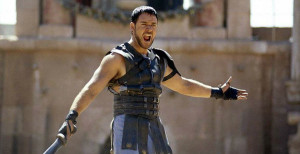
Ridley Scott, 2000, Number 46 on the list
“Are you not entertained?” was the phrase that would boom through my house after the lights went out upstairs. My father would stay up late, usually re-watching films he enjoyed, one of those was Gladiator. I remember hearing Maximus screaming that line, enraged at the cheering crowds, at Commodus, at everyone. Gladiator is one of those films I have no qualm with. I imagine there are flaws to other viewers but to me it is a film both exciting and challenging, beautiful (with Scott’s direction and Zimmer’s music) and full of sentimentality.
Rebecca (& Versions)
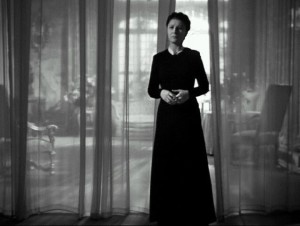
Alfred Hitchcock, 1940, Number 155 on the list
Adaptation of Daphne de Maurier’s novel of the same name.
Mrs Danvers is a weird woman. Her eyes are dark and cold, her face says nothing, her voice doesn’t move, she is a woman of secrecy and torment, deep down a broken-spirited, angry person. Her devotion and love for the first Mrs de Winter is more than a maid’s love for her mistress, she loves Mrs de Winter almost as a lover but I’m not quite sure. When the second Mrs de Winter comes in (the second with no previous name of her own, the book and film is full of mis-identity, of who/what defines her) Danvers isn’t best pleased, to put it mildly. Her voice changes only once, it takes an even more twisted, weird turn when she’s persuading the second Mrs de Winter to jump out of the window. “Just do it, it would be so easy,” she lulls, her Luciferian presence, her wrought jealously in that voice that haunts Hitchcock’s screen. Danvers is a cruel, calculating woman. She manipulates the second Mrs de Winter into wearing a costume she knows will remind Mr de Winter of his late wife and also annoy him. She plays with the second Mrs de Winter, using her trust, she tries to break her. Although I was drawn to Danvers’ mystery of motive, her true intentions, I became fond of the second Mrs de Winter who plays back, who wins, who watches as Mrs Danvers disappears in the flames, holding Mr de Winter’s hand, someone else now.
Dr Strangelove or: How I Learned to Stop Worrying and Love the Bomb (& Politica)
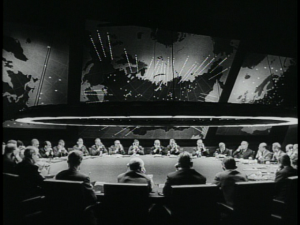
Stanley Kubrick, 1964, Number 51 on the list
Kubrick is an auteur, that we don’t need to question. His stories aren’t always strong. His characters aren’t always obtainable. I was nervous about Dr Strangelove. I watched it with my friend, Rhidian, who described it as “un-Kubrick, a comedy.” It was indeed a comedy and I laughed. I laughed, mainly, at the politeness of the whole thing, at President Merkin Muffley (Peter Sellers .1) in the War Room trying his best not to insult Dimitri Kissov on the hot line. I laughed at the silliness yet seriousness of the whole thing – the underlying message of atomic bombs and nuclear power. It was quite un-Kubrick but I saw a lot of him in there, a lot to admire, a lot to appreciate.
Psycho (& Notes)
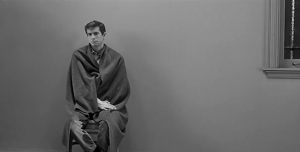
Alfred Hitchcock, 1960, Number 34 on the list
Adaptation of Robert Bloch’s novel of the same name.
I watched Psycho for the first time in the early hours of the morning, in bed, as part of this challenge. When watching it I thought I should take the challenge more seriously – I should be armed with a pen and my notebook to scribble notebooks, especially as the list contains so much Hitchcock. I didn’t have a notebook but I’m sure the only thing I would’ve been able to write was ‘fuck me, this is a great film’. I wasn’t able to write notes because I was completely enthralled by the film. I knew the story. Psycho is another heavily referenced film in modern culture that from Mrs Doubtfire’s in a dress with a wig shouting, “Ah, Normal Bates!” to Scream’s Danny Loomis quoting, “we all go a little mad sometimes” is hard to not be bogged down with information. But watching the film was its own experience – it removed me from my ability to write and be part of the outside world. It reminded me of what good cinema is, what the fundamental core of cinema is – escapism. Hitchcock is clever and patient, Perkins is ice cold and adorable at the same time, the story is tangled around MaGuffins and horror tropes, underlying a psychological situation. In short, the film is incredible, it retains its right to be as loved as much as it is. It is my favourite Hitchcock film to date.
Monster’s Inc (& Fondness)
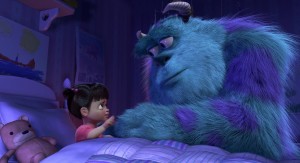
Peter Doctor, 2001, Number 216 on the list
Pixar and Disney amalgamate into one sprawling piece of history – classics have been made, characters we will always hold dear and long to meet for the first time, again. They are substantially different – where Disney seems to me a broad, overlapping string of classics, sequels, revisits and big Blockbusters, Pixar seems concentrated, cautious and daring. I’ve watched Monster’s Inc dozens of times and each time I watch it I am soothed, I am comforted, I am heartened. It is a touching film. It is a story of monsters and what it means to be a monster, what it means to cause fear and what it means to be good. Pixar makes me care about its characters and Monster’s Inc made me care about Sully, Wazowski, Boo, even Randall. Especially Randall. I’ve always had a fondness for villains.

About Thomas Stewart
Thomas Stewart's fiction, essays and poems have been featured in The Cadaverine, Ink, Sweat and Tears, The Stockholm Review, Agenda Broadsheet, Flight Journal, The Fat Damsel, Lies, Dreaming, Anomaly, among others. His debut poetry pamphlet, 'Creation' is forthcoming by Red Squirrel Press. He has an MA in Writing from Warwick and a BA in English from South Wales. He enjoys folk music and is afraid of the dark. He can be found on Twitter at ThomasStewart08.




